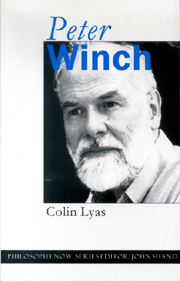Book contents
- Frontmatter
- Contents
- Preface
- Introduction: Peter Winch, a glimpse of a life
- 1 “Such understanding as I have”: The influence of Wittgenstein
- 2 “I was investigating the notion of the social”: The idea of a social science
- 3 “Seriously to study another way of life”: Understanding another society
- 4 “Good examples are indispensable”: The ethical life
- 5 “The concept of God is used”: The religious forms of life
- 6 “The interval of hesitation”: Peter Winch's Simone Weil
- 7 “Someone willing to die for truth”: Peter Winch's legacy
- Envoi
- References
- Index
2 - “I was investigating the notion of the social”: The idea of a social science
- Frontmatter
- Contents
- Preface
- Introduction: Peter Winch, a glimpse of a life
- 1 “Such understanding as I have”: The influence of Wittgenstein
- 2 “I was investigating the notion of the social”: The idea of a social science
- 3 “Seriously to study another way of life”: Understanding another society
- 4 “Good examples are indispensable”: The ethical life
- 5 “The concept of God is used”: The religious forms of life
- 6 “The interval of hesitation”: Peter Winch's Simone Weil
- 7 “Someone willing to die for truth”: Peter Winch's legacy
- Envoi
- References
- Index
Summary
That the social sciences are in their infancy has become something of a platitude amongst writers of text books on the subject. They argue that this is because the social sciences have been slow to emulate the natural sciences. … I propose, in this monograph, to attack such a conception.
(Winch 1958: p. 1)Sociology
The academic senates, which once governed the academic life of British universities, were often rocked to nightmare by contentious issues. These ranged from the important, for example, whether women should be admitted to a university, to the trivial, for example, whether students should be allowed to write with ball-point pens. Rarely, however, in my long experience, did senates address themselves to questions about the purposes of a university education and to questions about the inclusion of which subjects of study might or might not serve that purpose.
About thirty years ago, not long after the publication of Peter Winch's controversial book, The idea of a social science, the university of which I am a member, being then a new foundation in the diastole of its development, addressed itself to just that sort of question. For the question arose whether sociology should be added to the list of subjects appearing on the academic menu. The debates that ensued were, for our present purposes, enormously instructive. (A delicious glimpse of them is to be found in Malcolm Bradbury's novel The history man.)
- Type
- Chapter
- Information
- Peter Winch , pp. 39 - 68Publisher: Acumen PublishingPrint publication year: 1999



